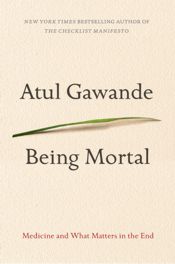Live Better Longer
![[]](images/left_chunk.jpg)
BOOK REVIEWS and Discussion Questions
Being Mortal, Medicine and What Matters in the End
Balancing the power and options of modern medical treatment with quality of life is becoming increasingly challenging. Anyone who has faced or
contemplated this challenge will find Atul Gawande’s latest book, Being Mortal, Medicine and What Matters in the End, compelling and thought-provoking.
As a surgeon and best-selling author, Gawande is uniquely qualified to tell the story of how medical science can and must do a better job of providing the
best possible quality of life right up to the end.
Originally, nursing homes were developed to clear out hospitals, the original caretakers of dependent elderly, when hospitals could no longer handle the increasing numbers of dependent older adults. Hence the name "nursing" home. He then goes on to describe the first "living center with assistance" which provided respectful, client-centered care and compares it with the current reality of life for most people in nursing homes.
The final part of the book delves into the complexity of providing medical care that supports quality of life and the challenges of determining when treatment does more harm than good. Drawing from personal experience with patients and his father, he illustrates the difficulty of choosing the right care and treatment and how answering the following questions can help guide that choice.
- What is your understanding of the situation and its potential outcomes?
- What are your fears and what are your hopes?
- What trade-offs are you willing to make and not willing to make?
- What is the course of action that best serves this understanding?
- Dr. Gawande candidly shares his own struggles discussing prognosis and the value of possible treatments with his patients. Having recently dealt with many of these issues, I related personally to the struggles he described and found hope that medicine will get better at providing care that supports a good life-right until the end.
- What is the major issue addressed in Being Mortal?
- How does the author address this issue?
- What experience have you had with senior living facilities?
- What are the characteristics of the ideal living environment for you or a loved one when you or your loved one can no longer live independently?
- What experience have you had with medical treatment options for terminal illness?
- How might answering the four questions cited by Dr. Gawande have helped?
- What role would you like your doctor to play in helping you make decisions about medical treatment options?
- Dr. Gwande describes two kinds of courage required in aging and sickness. The first is the courage to confront the reality of mortality and the second is to act on the truth we find. What is your reaction to this?
Being Mortal, Medicine and What Matters in the End, Atul Gawande
Metropolitan Books
978-0-8050-9515-9
$26.00 (282 pages)
Henry Holt and Company, LLC
175 Fifth Avenue
New York, New York 10010
2014
Metropolitan Books
978-0-8050-9515-9
$26.00 (282 pages)
Henry Holt and Company, LLC
175 Fifth Avenue
New York, New York 10010
2014

